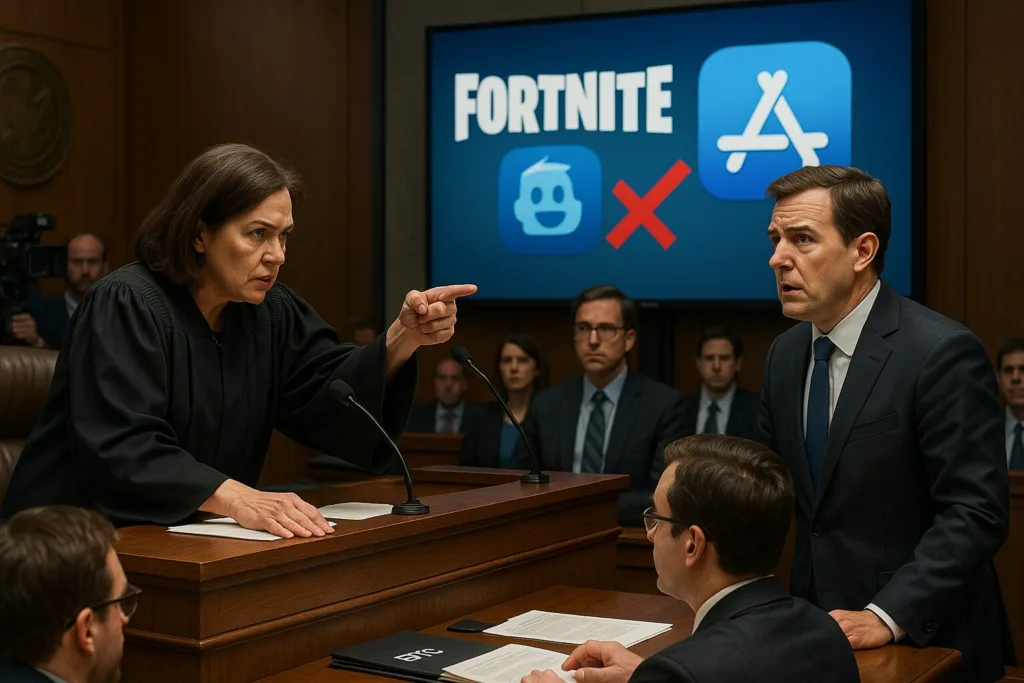When you purchase through links on our site, we may earn an affiliate commission. This doesn’t affect our editorial independence.
The Epic Games vs Apple lawsuit has taken a new dimension. A federal judge recently asked Apple to approve Fortnite’s submission to the U.S. App Store. Additionally, the judge gave Apple an alternative route: to return to court to explain, on legal grounds, why it has not complied with the court’s rulings.
According to a new filing, U.S. District Judge Yvonne Gonzalez Rogers acknowledges the court’s receipt of Epic Games’ latest motion. In the process, Epic Games demands that Apple approve Fortnite for distribution on the App Store and nothing more pretentious.
Apple’s Action Sparks Judge’s Anger, Demands Staff Member’s Details
Annoyed with Apple’s reluctance to obey the court’s decision, the judge asks Apple to prove the “legal authority upon which Apple contends against obeying the court’s order.” Judge Rogers also recommends that Apple return to court to explain its position as soon as possible if the situation is not addressed.
TechPolyp suggests that Rogers seems interested in legally settling the Epic Games vs Apple lawsuit. Hence, she charges Apple with mentioning the company’s official who is responsible for ensuring compliance with the court’s ruling. The federal judge reminded Apple that it can resolve this issue without further briefing or a hearing.
However, a careful analysis of the demand for the name of the Apple official in the new filing suggests something more spectacular. This could be that Gonzalez Rogers is likely considering contempt charges for failure to comply with the court’s injunction.
This is in furtherance of her ruling, in which the judge mentioned Apple for attempting to circumvent the court’s orders. In the Epic Games vs Apple lawsuit, she also accused the tech company of lying under oath.
Shortly after winning the right to include links to external payment mechanisms in its app, Epic Games refiled Fortnite to the U.S. App Store. Unfortunately for the game maker, Apple replied that way. Apple said it would not take action on Epic Games’ submission until after the Ninth Circuit decides on Apple’s pending request for a partial stay of the new injunction. Furthermore, this implies Apple wouldn’t approve the app until the legal proceedings around its appeal are finished.
Epic Games vs Apple Lawsuit: Epic Games Seeks Court’s Assistance Over Apple’s Continued Denial
On Friday, Epic Games filed a motion to compel the court to enforce the injunction, given Apple’s decision to disobey the ruling.
The latest development in the Epic Games vs Apple lawsuit follows a years-long court battle over Apple’s App Store policies. Unfortunately, these policies have long denied app developers the right to link to external payment options without paying Apple a commission.
Moving forward, it is noteworthy that Apple initially complied with the court’s decision in the lawsuit. It subsequently allowed the U.S. developers to apply for an exception to its App Store rules. However, Apple still secured a 27% commission on those alternative purchases, a reduction of just 3% from the usual 30%. Besides, Apple made developers use warning screens that hinted to consumers that it doesn’t support external payments. However, this development sparks EU backlash against Apple, so it attempts to go after this tech giant.
Furthermore, Gonzalez Rogers’s ruling on the Epic Games vs Apple lawsuit favours developers. In her decision, Apple was in “wilful violation” of the court’s injunction on anticompetitive pricing and commissions. She noted that this should have seemingly allowed Fortnite to return to the App Store. However, Apple refused to act on the submission for a week. It declined to approve or deny the game’s publication while its lawyers crafted a response.
Apple’s Lawsuit May Trigger Subsequent Legal Actions — TechPolyp
TechPolyp has suggested that this occurrence could be significant for Apple because it may inspire similar legal action or regulation in other world markets.
Apple won in Epic’s original antitrust lawsuit against the tech giant, as the court ruled it was not a monopolist. Epic Games also had a good outing when Gonzalez Rogers agreed with one of its contentions. This particularly involved the fact that iPhone users should have access to other payment options; perhaps a developer wanted to use its website for in-app purchases. This could include virtual goods or subscriptions.
This decision sparked Apple’s swift action to update its App Store policies and apps for the U.S. In addition, Spotify, Amazon Kindle, and Patreon quickly rolled out new versions of their apps to take advantage of the new functionality.
